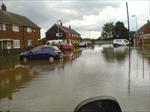More, better paid council engineers to fight floods
- Published: 25 June 2008 09:46
- Author: Jackie Whitelaw
- More by this Author
A revival in local government technical skills with much higher pay scales for public sector flood engineers was called for this week by the government's key advisor on flooding strategy.
Speaking to NCE ahead of the launch of his final
report today, Sir Michael Pitt advocated placing
responsibility for local flood defence and response
with local authorities.
The Environment Agency meanwhile will take the lead
on national, strategic policy for river, coastal and
surface water flooding.
"Local authorities should take a strong leadership
role in their communities on the issue of flooding –
be it in relation to development control decisions
or tackling local flooding issues on the ground,"
Pitt told NCE.
"But we will need a technical renaissance in local
authorities to drive this through."
Pitt's final report, Learning the Lessons of the
2007 Floods, says that local authorities need a
strong technical centre so they can be capable of
commissioning and challenging expert external
advice.
"This will be central to ensuring that local
communities are properly protected and that
development that increases the risk of flooding does
not take place," says the report.
The recommendations follow Pitt's promise earlier
this year to call for a senior flood engineer in
every county council and unitary authority in
England and Wales (NCE 24 January).
Pitt said he recognised that this would be a
challenge in the face of dwindling engineering
departments in local authorities where much of the
engineering specialism "is now limited to highway
engineering."
Salaries would have to rise for public sector flood
engineers if enough are to be attracted into the
sector, the report adds.
ICE's Engineering Skills for Flood Risk Management
2004 report predicted a 19% shortfall in public
sector flood professionals by 2009. But there was no
shortage of flood risk engineers in private sector
consultancy.
"This may be due in part…. to the level of salaries
on offer," Pitt said. "If local authorities wish to
attract high-calibre candidates they will need to
demonstrate their commitment by offering attractive
remuneration packages."
"Without the appropriate technical renaissance of
local authorities there is a danger that many of our
recommendations will not be delivered effectively,"
says the report.
Pitt said consulting engineers should still be
relied on heavily by councils "but there will be
real benefits in having in-house expertise,
including getting maximum value out of partnerships
with consultants."
Other Recommendations
Flood defence spending to rise in real terms every spending review
Strong presumption against building in high flood risk areas; properties at risk should be resilient to flooding
Developers to pay to build and maintain flood defences in high risk areas
Use the economic regulatory framework to provide appropriate economic incentives to increase the resilience of critical infrastructure
Enhance capacity to absorb shock and act quickly through mandatory business continuity planning
Ensure effective emergency response at local level through improved information sharing
Tell people if they are in the
path of flood water from potential dam bursts
Improve mapping, modelling and forecasting with Met Office and Environment Agency working together to do this
Fully funded national capability for flood rescue
Roads and rail to respond faster to flood warnings and have emergency welfare plans for stranded passengers
Rethink flood codes system as it is too complicated

